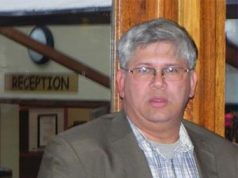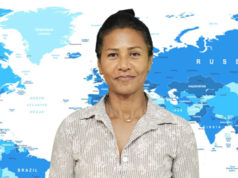Can we thrive on ‘eating’ arms?

For decades, the cold war between the USA and the Soviet Union has been draining billions of dollars on military spending, arms race and investment space militarization. Even after world-recognized Thought Leader Mikhail Gorbachev initiated Glasnost/Perestroika (a deep reform of the Russian socio-economic and political fabric for Transparency/Openness to move the Soviet Union from a communist to a more progressive and affluent society with a focus on de-militarisation, the last decade has witnessed a re-activation of the insidious arms race, with the help of technology.
Military budgets of most superpowers have been rising thanks to the operation of a strong war lobby with close interest to the international financial system fuelling unjustified attacks and violation of international law in a number of countries, killing millions and expanding illegal occupied territories. Fuelling wars and conflicts have been an excellent marketing strategy for arms dealers. We were recently on the brink of a major war between the USA and Iran..

The Indian Ocean, once a peaceful haven has now become heavily militarised with the Chagos issue and with the increased presence of India in Agalega. We also learn that Mauritius is a loyal arms buyer from India. But can we thrive on eating arms? Do we really need a defense budget or we urgently need reallocate precious funds elsewhere and invest in food security instead of a so-called military security?
In Mauritius, what urgent reforms need be initiated for us to thrive peacefully? The Covid 19 global pandemic poses a common threat to the international community and induces all superpowers to re-think the term Security, with an urgent re-allocation of military spending to civil spending and more particularly to health systems, food security, business climate enhancement, manpower re-alignment, innovation economy and education. Mauritius should urgently focus attention on some critical Transformations. We propose to discuss them today and ask ourselves a series of fundamental questions as to how together with the Government, we can make these tangible realities.
1. Mind-Set Change/ Re-thinking Leadership: Can we Re-invent our society?
Thanks to their respective roles in society, our political and business leaders have tremendous power in their hands to initiate reforms and make things better for the coming months and years. Given the critical economic situation looming on the horizon, with unemployment, bankruptcies, and layoffs, company owners/directors/Board Members as well as our political leaders will have to be held accountable by citizens and consumers to a larger extent on the decisions they will take for us. We are here talking about Brand Governance and Political Governance. What we are seeing instead is that C19 has been used to harden laws reduce employee rights and curb peoples’ freedom. This is alarming. Instead of boosting morale and creating a climate of confidence conducive to Investment, we are seeing the contrary happening.
Questions: To what degree they will challenge current corporate and political culture to come up with out of the box solutions? Can our Society be really re-invent? How urgent is it to address our political system failures? Are our business organizations and corporations working to protect the long term interests of their own organizations by protecting the key asset in any company – its PEOPLE – or do they think they have an army of robots from the so called AI craze to implement all roles, duties and tasks they need implement every day?
2. Food Security: towards a Sustainable Future?

C19 Crisis has highlighted the vulnerability of our country in terms of food security to the extent that at some point in time, had the right decisions not been taken, national security would have been a threat. Thanks to the intervention of whisperers, civil society opinion influencers, social workers, a powerful solidarity chain was on the march to organize various regular food distribution to people suffering from social and economic distress at the bottom of our ladder. Given our mass consumption-driven society built by media, marketers, importers, and manufacturers, the local supply chain also was under tremendous stress with initial panic buying, stock holding in the Food and Pharmacy segments most specifically. The current over-pricing of vegetables and other food items though there is no production scarcity at all, is alarming.
Low-income segments of the population are being adversely impacted by such a phenomenon. The future of food security will have to be spelled Local now. Alternative systems of productions with fewer intermediaries will have to crop up and better and better market-place solutions.
Mauritius has an extensive oceanic territory from which fish/seafood products constitute both an interesting supply to the local population and also a growing export earning provider. This represents a unique opportunity to train our traditional fishermen community, provide them with financial and technical means to operate modern fishing vessels to grow this sector further – while also investing in surveillance systems to prevent foreign fishing companies to loot our waters.
Apart from vegetables, we have a number of unexploited local fruits that can constitute regular sources of nutrients and vitamins. Most of these can be planted in our very back yards. Indigenous fruits like Vavang, Coeur de Boeuf, Rousaille, Fruit Cythère added with food plants like Fruits à pains, manioc and potatoes and medicinal plants like ayapana, aloe vera, Baume du Perou, and tulsi are among a long list of local plants that can contribute change our consumption patterns and habits, while it has been proven that eating local produces, protect ourselves from local illnesses.

Questions: who will drive this reform, re-allocate lands? What distribution systems should we adopt to reduce price exploitation by producers? What kinds of sustainable agricultural systems will emerge out of this crisis? Why do we not invest in modernising our fishing industry to grow this sector drastically while respecting the marine ecosystem? Why do we also not invest into a scientfic vessel that will on-board our home grown ecologists, marine biologists and other scientists to study the vast wealth that our marine territories contain. Is the Blue Economy still a dream or a reality or a nightmare? Why do we not develop our local endemic plants and fruits sectors to be export-led? How can the Bio Label form part of our Agri-tech strategy for the future?
3. People Development : the emergence of Meritocracy and Employee Branding

No nation, no organization no brand exist without its people. Talent is one of the most precious ‘natural’ resources that Mauritius has. Developing the right human resources development strategy ( HRD) , manpower planning for the country and employee branding strategies for organizations will be critical in allowing us to navigate through this crisis and the years of distress it will bring in its wake. Employment/promotion in Mauritius has most of the times been closely linked to who you know, what is your political backing, to which socio-cultural group do you belong? Transparent Employee Engagement strategies and employee branding programs that boost employee morale, loyalty, motivation, and performance are what make the real difference. We should urgently inspire ourselves from Scandinavian countries and Germany, initiate exchange programs with these initiatives to implement such practices. Our corporate cultures have to evolve. It’s a necessity. However, we are sadly witnessing only the starking and alarming contrary that is being politically engineered using C19 as a pretext.This unprecedented milestone in our 52 years of democracy will be cast in stone and will in fact be at the very detriment of the initiators.This sudden inordinate direction is not sustainable first and foremost for those in power themselves!
Questions: Who will ensure a revolution in our corporate cultures? How far our HR Managers, Public policymakers/High Ranking Public Officers, CEOs/COOs are ready to push for strategies to employ, train, & motivate employees based on true meritocratic principles, without considering caste, religion, color, and political affinity? What are the degrees of Employee Engagement in Mauritius? Can we re-define a new corporate Mauritius? How far the People of Mauritius will take their Destiny in their hands?
4. Restoring Equality by curbing Liberties & Rights?

Being a mixed economy operating under liberalist capitalism, our society is characterised by stark inequalities with pockets of poverty that have never been tackled in a structured manner by any responsible Government though highlighted in all electoral manifestos. Economic Growth and Wealth should be shared more equally amongst all components of our society for us to enjoy a higher Quality of life. Being a high-income economy as a national imperative is useless if wealth is not properly distributed. Balanced and equitable growth should be a strategic national objective that is also shared by conglomerates and the private sector to prevent us face social unrest. The Covid 19 spread in Mauritius has proven how non-proactive steps may have led to explosively dangerous riots if social workers, NGOs, individuals, and the GOM had not put in place the right protocols and social alleviation measures.
What we notice however is an un-explained shift from a fairly good start in compensating lower social classes to an all-around threat to liberties, rights of people and workers – in violation of constitutional principles under the cover of Covid -19!
Questions: Who will have the boldness to start with Transformation on the mode: La Charité Commence chez soi? To what extent does our political and business Captains at the helm, recognize that Change is most urgent and will they implement real sustainable Transformation? How Civil society and the political class in general ensure that we urgently restore sacred people and workers constitutional and occupational rights?
5. How can Humanised Technology guarantee our Future?

Necessity being the mother of Invention, it is high time that the legendary so called mauritian genius be structured into bringing local solutions to local problems. It is critical that the GOM encourages R&D in selected fields that can lead to short cycled product-to-market development, and giving grants for research while rewarding innovators and financing entrepreneurs as well. The issue of how to channel creative energies and ideas of entrepreneurs into structured support from inception to market is becoming critical but bureaucracy and favoritisme may be acting as powerful brakes. We just have to Think Out-of-the-box, challenge assumptions and ‘se remettre en question perpetuellement’. We should actively partner with the current generations X, Y & Z to make a new future happen. Artificial Intelligence can be a booster like it can be a danger as always pointed by Elon Must, Tesla and Space X Innovative Founder. Ideas and Progress are worth nothing if Actions are not fuelled by Resources ( Technical, Financial, Legal) and if they do not contribute to long term Human Dignity and Growth.
Questions: How much money does the GOM invest in R&D? How far can we create profitable micro Private Equity Funds or Angels Investors that would create Incubators for creative entrepreneurs and provide the right ecosystem for them to develop? Who will ensure that AI does not supersede his creator, the Human Being?
6. Citizen empowerment: the missing link ?

Democracy is meant to be the exercise of Power BY People and FOR People. Throughout the world, many countries have undergone exciting reforms that have opened up political processes to people. In countries such as the Philippines and South Africa, authoritarian governments have been brought down. In others, governments have taken significant measures to include women and other marginalized groups in public life. Countries such as Brazil, Bolivia, and Thailand have institutionalized laws about people’s participation in policymaking. Fairer elections have occurred without violence in dozens of countries where people have voted for the first time
However there is a long road between successful elections and accountable governments. Along this road, civil society continues to struggle for a legitimate voice and for honest, committed leaders to help guide the process. As economic globalization changes the terrain of economic development and the power of national governments, the challenges for improving political structures grow. With the probable enactment of the Covid Bill, all quarters of Mauritius is on alert mode as all this process towards citizen empowerment will be now curbed insanely surfing on the ‘virus of fear’ international media has been building recently.
Question: How can Citizens rise up and make their voices heard? What systems need to be put in place? What kinds of political leadership do we expect from all those members of parliaments that we have installed there? How can we expect increased Accountability from them? How can a sound Citizen-Government platform help in building a brighter future for the next generations?











